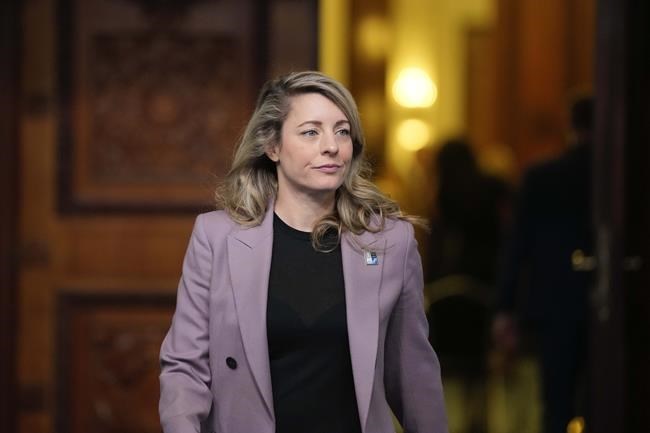OTTAWA — Foreign Affairs Minister Mélanie Joly said Monday that Ottawa has not been clear with the Canadian business community about the risks they face operating in China.
In a discussion with the Montreal Council on Foreign Relations, Joly said it's still up to industry to choose how much they invest in China, but she argued the federal government has a duty to help them navigate the risks.
"Governments, for a long time, did not necessarily inform the public and the business community concretely about the geopolitical risks associated with doing business in China," she said in French.
Last month, the government unveiled its long-awaited Indo-Pacific strategy, which seeks closer economic, military and diplomatic ties in the region to counterbalance China's growing sway.
Joly said in French that she will release an implementation plan "in the coming weeks," for the strategy, which experts generally welcomed but said was lacking in a timeline of short- and long-term goals.
"The current moment demands more of Canada," Joly said.
"The region is now looking for us to up (our) game. They want Canada at the table to build a better future for citizens on both sides of the Pacific."
Part of that involves working in lockstep with Asian allies.
"We want to be as close to (South) Korea, to Japan as (we are) to Germany, France and Great Britain; that's our goal," Joly said in French.
Canada is also seeking to increase its military investment in the South Pacific and to boost financing for the private sector to build infrastructure in developing markets.
That will help Canada's brand in developing countries, Joly said, and do a small part to counterbalance China's massive Belt and Road Initiative fund.
"We want to put a Canadian flag on our investments so that it will be clear among countries in which we invest that it's basically thanks to Canada that we're able to build a bridge, to build a retaining wall," she said in French.
"It's exactly what these countries need, what they're looking for, and they want more of Canada. But the problem in the past in the region is that we haven't always been reliable."
Joly also said Russia's February invasion of Ukraine has drastically reshaped how the West does foreign policy, with a focus on shoring up the rules-based international order.
"We didn't live through a year in international relations; we lived through a decade," she said in French.
"Canada participated a lot in the creation of multilateralism. We were the architect of a lot of these norms. And we're not a nuclear power; we have a huge advantage to have (these norms) respected."
Opposition parties have been skeptical about the Indo-Pacific strategy, noting that it was promised for years and sets nearly all its targets to be accomplished five years from now.
This report by The Canadian Press was first published Dec. 19, 2022.
Dylan Robertson, The Canadian Press



